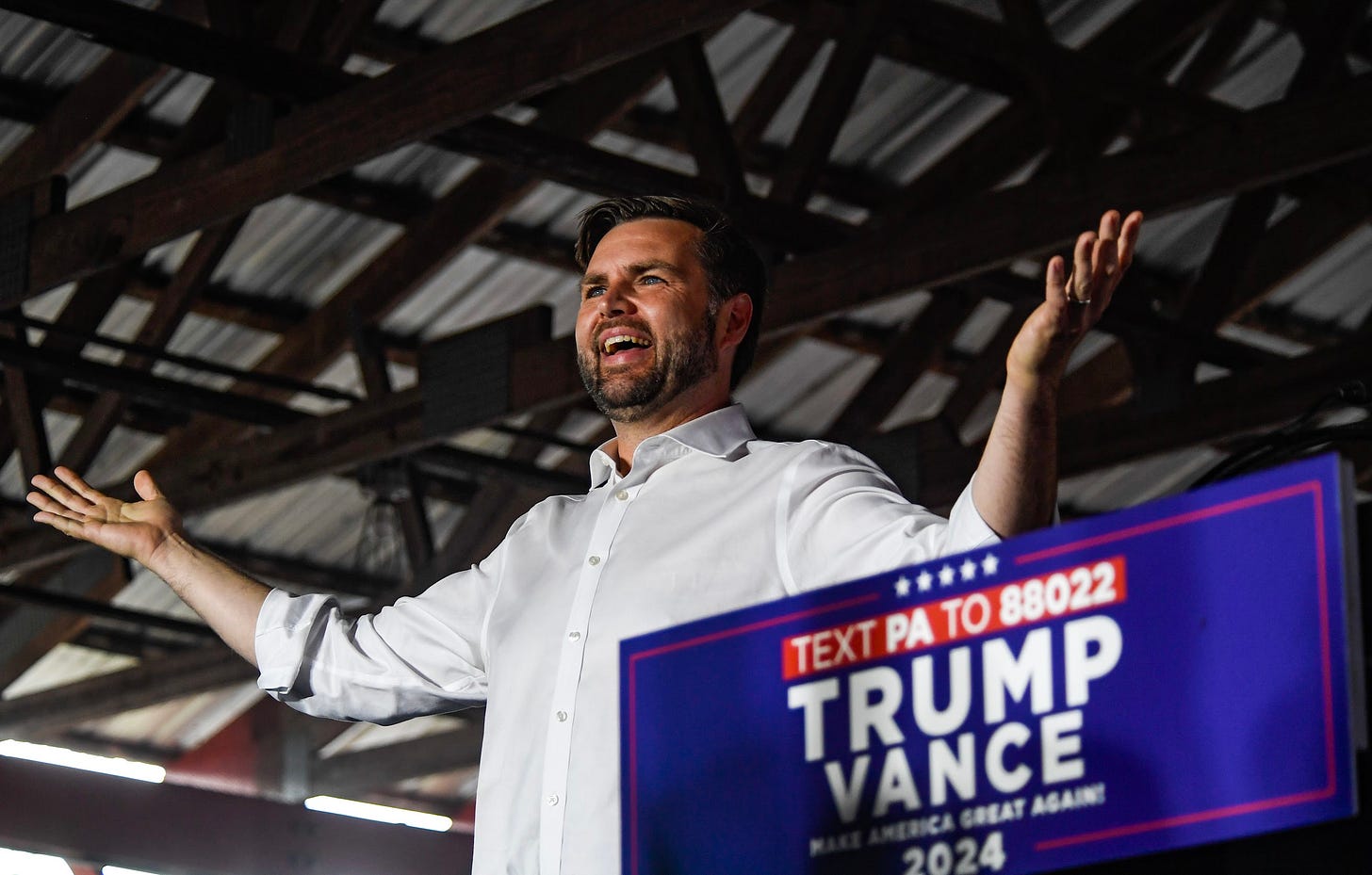Read the JD Vance Dossier
We’re publishing the supposed Iran-hacked document. Here’s why.
Behold the dossier.
It reportedly comes from an alleged Iranian government hack of the Trump campaign, and since June, the news media has been sitting on it (and other documents), declining to publish in fear of finding itself at odds with the government’s campaign against “foreign malign influence.”
I disagree. The dossier has been offered to me and I’ve decided to publish it because it’s of keen public interest in an election season. It’s a 271-page research paper the Trump campaign prepared to vet now vice presidential candidate J.D. Vance. As far as I can tell, it hasn’t been altered, but even if it was, its contents are publicly verifiable. I’ll let it speak for itself.
“The terror regime in Iran loves the weakness and stupidity of Kamala Harris, and is terrified of the strength and resolve of President Donald J. Trump,” Steven Cheung, communications director for the Trump campaign, responded when I asked him about the hack.
If the document had been hacked by some “anonymous” like hacker group, the news media would be all over it. I’m just not a believer of the news media as an arm of the government, doing its work combatting foreign influence. Nor should it be a gatekeeper of what the public should know.
On August 19, the U.S. intelligence community issued a statement on Iranian election interference, including cyber operations attempting to gain sensitive information. “This includes the recently reported activities to compromise former President Trump’s campaign, which the IC [intelligence community] attributes to Iran.”
On September 18, the intelligence community issued another statement going into further detail about Iran’s efforts. “Iranian malicious cyber actors” were still undertaking efforts since June, the press release says, “to send stolen, non-public material associated with former President Donald Trump’s campaign to U.S. media organizations.”
The intelligence community would not confirm to me whether the stolen campaign materials included the Vance Dossier. “We don’t have anything beyond what’s noted in the September 18 joint statement,” Lauren Frost, a spokesperson for the Office of the Director of National Intelligence, told me this week.
“Robert” offered the document to me in an email from an AOL address. That’s the same moniker used by the individual that reportedly provided other internal campaign materials to news media outlets. When I pressed “Robert” on their motives behind releasing the documents and their provenance, his reply was coarse:
“It doesn’t matter. Let the media and the authorities go ahead with their own guesses and bullshits [sic]. I just want to shine some light into the dark room.”
The room isn’t very dark. In fact, I’ve argued that while Iran, Russia, and China are attempting to stoke chaos in an already chaotic American political scene, there’s no evidence that any of these often harebrained efforts could actually swing an election outcome. These are the same “active measures” that have been undertaken since the Cold War. The United States does it as well. For the intelligence community and the FBI, it is a cat and mouse game to catch the other guys. But for the American people and the 2024 elections, it is unremarkable.
In July, the Office of the Director of National Intelligence issued a report saying that “the IC has observed Tehran working to influence the presidential election, probably because Iranian leaders want to avoid an outcome they perceive would increase tensions with the United States.”
But tensions between Iran and the United States are already at a fever pitch and likely to remain so, regardless of who is elected.
This is not the Steele Dossier of 2016, with its golden showers and anti-Trump fanfiction. Unlike the Steele Dossier, which was both fraudulent and discredited, the Vance Dossier is factual and intelligently written. No Jason Bourne style capers appear, and there’s no sleaze. Instead, the Vance Dossier enumerates pretty reasonable liabilities as a then-contender for VP nominee, including:
“Vance has been one of the chief obstructionists to U.S. efforts to providing [sic] assistance to Ukraine.”
“Vance criticized public health experts and elected officials for supporting Black Lives Matter protests while condemning anti-lockdown [Covid] protests.”
“Vance ‘embraced non-interventionism.’”
“In 2020, Vance criticized President Trump’s airstrike killing Iranian General Qasem Soleimani, worrying it would continue to bog down America in the Middle East to the advantage of China. Vance suggested that the country had been entangled in wars in the Middle East so ‘financial elites’ could profit from the rise of China.”
So the document is clearly newsworthy, providing Republican Party and conservative doctrine insight into what the Trump campaign perceives to be Vance’s liabilities and weaknesses. Those perceptions provide clues about what a campaign of remarkably little substance might actually think.
While the news media has paraphrased some of the contents of the dossier, what they haven’t done is provide the American people with the underlying document, in the language in which it appeared, so they can decide for themselves what they think. You decide for yourself.
— Edited by William M. Arkin


Thank you for publishing this. Having scanned the document, I can’t for the life of me figure out why other news outlets refused to do so. The report seems like a collection of open source materials with cogent analysis put together by professionals.
Thanks, Ken, for going where the information lies, in whichever meaning of the term applies. We need an actual free press, not a bunch of subservient gatekeepers!